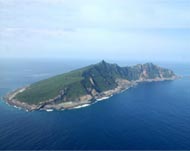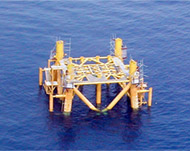China, Japan in oil drilling row
Japanese Foreign Ministry officials have criticised China for refusing to allow independent arbitration in a territorial dispute over drilling rights in the East China Sea.

Energy experts believe the East China Sea bed may hold deposits of natural gas and oil, both lucrative energy sources for two of Asia’s economic giants.
During a similar dispute with Vietnam, Beijing signed an agreement with Hanoi that recognised a median line between the two countries as their sea border.
But in its dealings with Japan, officials involved in ongoing talks say China is instead insisting on using the continental shelf in an attempt to extend its claims to more of the ocean – and the vital energy reserves that may lie beneath.
While it has long been suspected that oil and gas might lie under the East China Sea, drilling in the area has until recently been a technological challenge.
But with improvements in technology and the rising cost of global energy prices both nations are eager to secure new sources of energy to fuel their booming economies.
Prospecting work has only begun in earnest in the last two years, but it quickly became yet another bone of contention between two nations with a long history of animosity.
Sino-Japanese rivalries remain coloured by Japan‘s invasion and occupation – often brutally enforced – of a wide swathe of China in the early decades of the last century.
It takes little to crank up nationalist feelings of one population against the other, with a series of violent incidents in China in the last 18 months pointing to the level of tensions simmering beneath the surface.
For its part Japan claims it is being “generous” in the territorial dispute.
Under the terms of the 200 nautical mile exclusive economic zone, guaranteed by the United Nations Convention on the Law of the Sea, the terms would see Japanese waters effectively end at the Chinese coast.
Anomaly
 |
|
The Senkaku island chain has |
That anomaly is thanks to a series of small islands, among them the equally disputed Senkakus, known in China as the Diaoyutai islands, that push the 320-km zone to the west.
The rocky outcrops are uninhabited with several of them covering just a couple of square metres at high tide. That has has prompted China to claim they are not islands in the true sense and therefore cannot be used by Japan to extend its exclusive economic zone.
In response, Japan has placed concrete blocks around the islets to protect them from the sea, cemented a plaque into the ground to declare them Japanese territory and even assigned the isles a postal address.
Japan emphasises that it has no plans to take up that option and that the only way to determine the border is for both sides to accept the median line.
Citing previous cases in which disagreements have been decided by the International Court of Justice, the officials said Japan would be happy to have independent arbitration in the matter – but that China refuses to consider the suggestion.
“We have been saying since 1968 that we would abide by the ICJ’s decision in any territorial dispute, but China refuses to go to a tribunal and it cannot be forced to go,” said an official with the Japanese foreign ministry.
“In similar cases, the court has ruled that it cannot make a decision because one country is not represented.
“China is not playing by the rules,” he added.
He went on to explain that the dispute was not about business or financial gains for Japan.
“It’s an issue of sovereignty and the Chinese side’s claims are totally unfounded.”
Desire for dialogue
An official at the Chinese Embassy in Tokyo attempted to play down the dispute, instead emphasising Beijing‘s desire for dialogue.
|
“The Chinese side is doing nothing wrong and our two countries have no reason to disagree over this matter” Xiong Bo, |
“The Chinese side is doing nothing wrong and our two countries have no reason to disagree over this matter,” said Xiong Bo, a counsellor at the embassy. “The most important thing for us is that the situation does not escalate and it is for this reason that we are calling for more discussions.
“There is a difference of opinion over where the line should be drawn, with Japan insisting on adopting the central line,” he admitted. “But China believes it is within its rights to be drilling where it is. What are needed are government-to-government talks to resolve the issue.”
Japan, however, believes the tension has been raised several notches by the sighting of a five-vessel squadron of warships conducting manoeuvres in the area in recent weeks. There is speculation in Japan that the unit has been formed specifically to patrol near the disputed waters as a show of force.
Japan is using Coast Guard vessels in the area and is “angry at the escalation”, fearing that a minor scrape between ships from the two sides could lead to far more serious responses.
There is also concern at the likely response from China when Japan‘s Teikoku Oil begins exploratory work. The company has been granted permission to start drilling by the Japanese government at a spot to the east of the median line – although that area falls within what China claims as its own.
Others have suggested that China’s stretch for control of greater stretches of the sea are an attempt to undermine Japanese sovereignty over the Senkaku Islands, particularly if the United States fails to clearly state its position in the argument.
Matters of history
Analysts believe that the debate revolves more around matters of history than unlimited supplies of natural resources.
“It’s far less an issue of oil and gas than a matter of national sovereignty, and that goes back to the past historical problems that exist between the two countries,” said Stefan Worrall, an economist with Credit Suisse First Boston in Tokyo.
“We don’t have any accurate estimation of how much oil or gas might derive from these deposits and I don’t think either Japan or China do either.
“It’s not really an economic issue at this stage, it’s far more a national pride thing,” he added.
 |
|
Japan has already granted oil |
The Japanese government has granted Teikoku Oil Co. permits to carry out exploratory drilling in the area, although a company official said work would not begin while the two nations remain at loggerheads.
“We do not know when we will be able to start our research as the timing is very important,” said Masaki Akasaka, a spokesman for the Tokyo-based firm.
“We want to go out soon but there are many issues that we have to take into consideration. Safety is of the utmost importance and we will need the government’s support. When everything is in place, we will start work.”
Joint development proposed
The two sides have held three rounds of talks on the matter since October of last year. The most recent was in early October, during which Tokyo proposed joint development of oil and gas reserves in fields that straddle the median line.
The proposal repeated the position that China would be free to develop fields to the west of the median line and Japan to the east, but that until a final agreement is reached, China should suspend ongoing development work.
Japan is awaiting a response from Beijing and is hopeful that the date for a new round of talks can be agreed, possibly within the next month.
“The first two rounds of talks were very tough, but at the director general level they are getting slightly better now,” the Japanese Foreign Ministry official said.
“Between legal experts, there is still a very hard atmosphere, with the Chinese side simply reiterating the same position. We hope to receive a reply on joint development at the next round.
“Are they going to say ‘yes’? Probably not,” he admitted. “But at the same time, we simply cannot accept their proposals.”